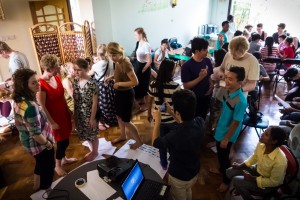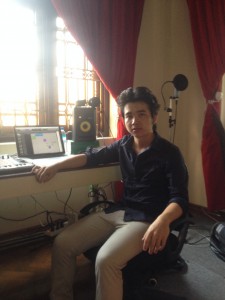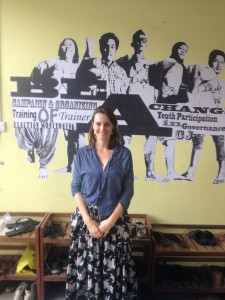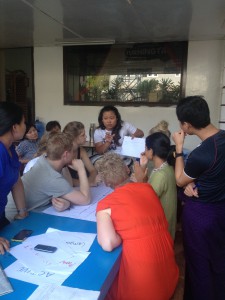The spacious four-story training center “Global Platform” of the International NGO ActionAid,in Myanmar’s capital city of Yangon, is gaining the reputation as a hotbed of creative political activism that could prove vital for the future development as this Southeast Asian nation transitions towards democracy. Global Platform Myanmar provides a place where idealistic youths come together to learn about political actions, active citizenship and accountable governance – fundamental democratic concepts that up until a few years ago had been suppressed by successive military governments.

The high-ceilinged ground floor was buzzing with activity when this writer arrived. The room was packed with young people, mostly Burmese and Danish. That day, the Global Platform house played host to a class of Danish Folk High school, Krogerup Højskole, students who came visiting. They were attending a course “The world is burning”, and they were there to record a song with some Burmese activists.
“Fighting for change”, “An inspiration for a new generation” the lyrics pretty much summed up what Global Platform Myanmar is all about. Building the foundation for Myanmar youths to begin to speak their minds, to learn about their rights and to become citizens of a fledgling democracy at a time when the country is gradually becoming a more open and tolerant society.
Anne Louise Carstens, Global Platform Training Quality Manager, said she and her staff are working on different levels with different groups of young people since ActionAid Denmark set up its Myanmar chapter in January 2012 .
“We have informal arrangements, such as organizing public campaigns. And then we also do in-house projects, like policy briefs, offering courses in human rights and what democracy is about. It is still not possible to study political science in this countrywhich explains why members of the young generations are so hungry for knowledge,” she said.
Global Platform is the youth training center of ActionAid, known as “Mellemfolkeligt Samvirke” in Denmark with global training centers in 10 countries around the world. There are three international staff members and eighteen locals at the house, working in different roles, including fundraisers, trainers and admin and support staff. The house also makes available 45 beds to accommodate trainees and participants from outside Yangon.
[icopyright horizontal toolbar]
There was a relaxed atmosphere and an air of informality at the house, something resembling a hangout for youths, which is precisely the right kind of vibe, Anne Louise Carstens said.
“We want the place to have an open atmosphere where the youths can come and go. That applies to our training sessions as well. It has to be fun and inspiring. The participants are making videos, conducting workshops or are out in the streets talking politics, instead of sitting around looking at Power Points.”
Turning Tables
That day the music was loud and up-tempo. The Danish students were enthusiastically working on a song with 26-year-old Burmese music producer Ronald Aug a.k.a “I2”. who is a part of Turning Tables, a Denmark-funded activist radio and video concept,. Founded in October 2013,the youth and music focused NGO shares the same roof as Global Platform, with which it collaborates on several projects.

“Music is my passion. I am here everyday and on the weekends too. This a great place for me to keep evolving as a musician and I’ve learned a lot about digital music and techniques here,” he said. I2 also takes care of the booking at the Turning Table Studio. Young people can come and record songs with social messages and ideas, an already popular concept as is evidenced by fully-booked schedules. Musical instruments and recording studios are few and far between in Myanmar.
Michael Åberg, the Swedish Lab Manager at Turning Tables, saw it as an opportunity for marginalized youths to be able to learn how to create multimedia contents.
“They become acquainted with all the hardware, learn how to shoot and edit videos. And they are all very knowledge-hungry,” he said. Michael Åberg said it was exciting to be working with all the unpolished local talents at the studio.
In February, Turning Tables released its first rap music video on YouTube titled “Freedom” with three local rappers chanting lyrics about a better and freer society.
Eager to learn
The excitement and eagerness to learn emanating from Turning Tables studio was palpable and swept through the entire house. On the week that the Danish folk high school students were visiting, there was also a group called “Doctivists” attending a two-week course, during which a group of young locals got to experiment with small video projects about social change and record their own personal video diaries.
Anne Louise Carstens said working with Myanmar youths on a daily basis is very inspiring.
“Look at Zalat. She was a participant on my very first training course here, now she works here full-time after having gained so much strength of character and confidence,” she said. 23-year-old Zalat, or Than Man Vung, is a trainer and officer in charge of facility at Global Platform. She was the main organizer of the workshop and recording session of the Danish students.
Zalat has been doing different kinds of social work since she was 19, and became part of Global Platform since the beginning of 2013. She usually facilitates campaign workshops in which she trains her fellow Burmese how to be creative and how to become aware of their own skills.
“I led a course with 20 participants recently, and during the workshop, I asked them to raise their hand if they considered themselves to be creative. Only a few did. Then I asked them all to draw an animal that does not exist in nature, and once they finished, I could point it out to them that creativity was something they could find within themselves, “ Zalat recalled.
Still precautions to be taken
In 2011 the military junta in Myanmar was officially dissolved following the 2010 general election, and a civilian government, headed by former army general, was installed. The country now opens itself up for business with foreigners and the locals are no longer as afraid of speaking their minds on political issues as they used to be. But there are still ongoing ethnic conflicts in the country and the strict rules against public protests stay in place.

This is a reality that Global Platform also has to cope with.
“We were very careful when we began our work two years ago. And we still are. Medecins Sans Frontieres (a French NGO) has just been kicked out of Myanmar recentlyso obviously there are still precautions to be taken. And a couple of months ago, two of my local friends were put in prison for doing an anti-government protest,” Anne Louise Carstens said.
“Much progress has been made during the last two years. There is now free media, and the people are gradually being given more political rights – something that the people take time to get accustomed to.That is why it is so important to reach out to the young generations,” she stated.
“When we ask people about the one thing that might be holding them back from doing activism, we are told that the fear of not getting support from family is the biggest obstacle. When participants go home from one of our workshops, some of them get asked sarcastically by the family “Oh, so now you are going to prison?” The older generations are not as receptive to changes that are happening in society, as they had been kept under tight control for so long.
A brighter future
The transformation from years of authoritarianism to democracy is not something that can happen overnight. But the change is swift. Sigrid Lauenborg Dahl, one of the teachers from Krogerup Højskole, said Myanmar was a different country now, compared to the place they visited as a part of their study visits a few years ago.
“Back then many of the locals hesitated even to talk to us. Perhaps they were afraid of being thrown in jail for speaking their minds. Now you can sense a more relaxed attitude and openness, that is true with people on the streets to the taxi drivers, “ she said.

That sense of joy and idealism can be easily felt at the Global Platform house. From the vibe and enthusiasm coming from the Global Platform team and more importantly the local youths, it seems like aid money well spent. When asked where she sees Global Platform Myanmar is headed in a few years, Anne Louise Carstens said she saw a potential for Myanmar people arriving at the point where they could show solidarity with other countries with similar democratic aspiration.
“The first years we were still in consolidation phase. We hope to expand our network and gain more regional cooperation by having more participants from other Southeast Asian countries and open up for trainings for youth from Scandinavia and Australia. But our main focus is clear, that is to train the young Burmese to become active citizens in an evolving democracy,” she said. So far, it seems that they have achieved just that.
Visit Global Platform, Myanmar Website

